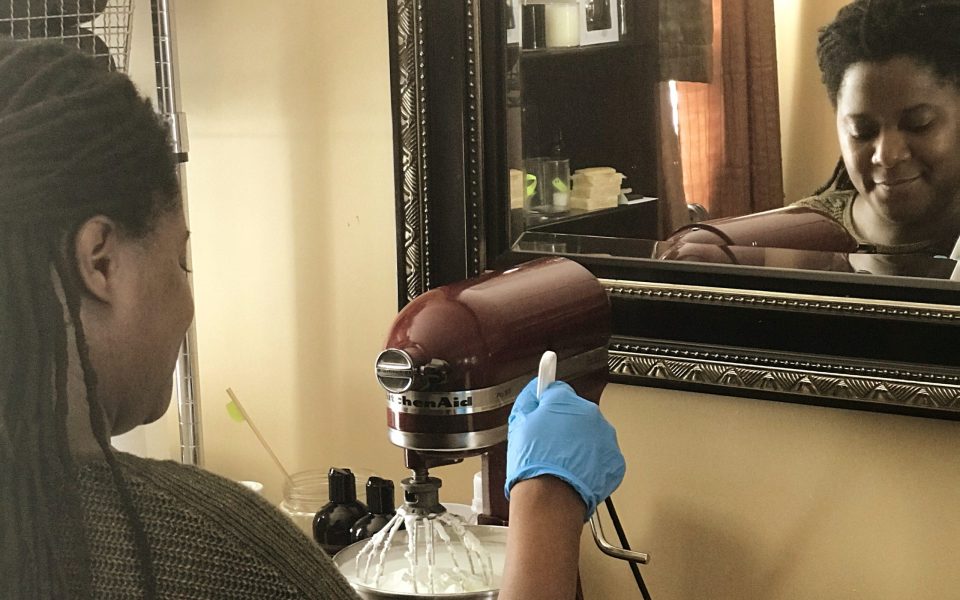Shayla Herndon-Edmunds, who won a $25,000 award through the 2017 Creative Startups Southeastern Accelerator, wants to keep her health and beauty products business close to the ground.
Shayla Herndon-Edmunds’ health-and-beauty business is a home operation. Much of the time, the surface space in her dining room and living room are monopolized by trays of soap setting in a drying process that takes four to six weeks. Her KitchenAid mixer has performed reliable service turning out batches of shea butter.
Thanks to a $25,000 award from the Center for Creative Economy and five hours of legal services from Kilpatrick Townsend law firm in Winston-Salem in recognition her first-place finish in the 2017 Creative Startups Southern Accelerator, Herndon-Edmunds is ready to scale up her business, Oh My Goodness Herbal Bar.
Herndon-Edmunds, who serves as director of diversity education at Wake Forest University, had long recognized an unfilled need for healthy beauty products for people of color.
“I can remember being a kid going to a retail store with my mom, and there was only a section of an aisle geared towards African Americans and people of color,” Herndon-Edmunds said during a recent interview at Dioli’s Italian Market, up the street from her office at Wake Forest. “I’m 37 years old, and it’s still one end cap or a couple shelves. Less than a quarter of the products are made with healthy ingredients. This product might be attentive to an issue I’m having with skin eczema and acne, but it comes with toxic ingredients. I have two small children, and I get to decide what health and beauty products they use for 18 years. I figured I can create a solution.”
Herndon-Edmunds said African-American women spend $7.5 billion annually on health and beauty products, and meanwhile overall spending on natural and organic health and beauty products is projected to grow to $19.8 billion by 2022. While some of the products are being marketed to African Americans, the Winston-Salem entrepreneur figures her ground-up approach will be more responsive to her clients’ needs.
Herndon-Edmunds started the accelerator at the beginning of August. The first seven weeks consisted of two online-coursework sessions per week, and in the eighth week participants from around the region came together in person for coaching and peer support.
“The common theme that was somewhat reassuring is how overwhelming it is,” Herndon-Edmunds said. “You start thinking: Maybe it’s just me that’s having a hard time. I feel like my team helped me refine how I think about my niche.”
The $25,000 award, which also comes with a commitment of 12 months of mentoring, fills a crucial gap in the development of Oh My Goodness Herbal Bar. Herndon said most banks require small businesses to go three years cash positive before they’ll consider making a loan — something that’s simply not realistic for a start-up.
“This has given me an advantage to get started that I wouldn’t have other than raising money from family and friends — which isn’t an option,” Herndon-Edmunds said.
The $25,000 award is an interest-free loan, and Herndon-Edmunds said part of the beauty of the arrangement is that while she builds her business, she’ll be circulating money back into a fund to support other entrepreneurs down the line. She’s been meeting recently with the Center for Creative Economy, the Winston-Salem nonprofit that hosts the Creative Startups’ Southeastern Accelerator, to figure out how to spend the money and come up with a repayment schedule.
In the short term, Herndon-Edmunds is exploring the possibility of leasing from a maker space with a culinary-arts focus that’s in the planning stages.
Although 80 percent of Oh My Goodness’ sales are online with a reach across the country that includes military bases, direct contact with customers in Winston-Salem is important to Herndon-Edmunds.
“What I’m excited about is launching regular pop-up shops,” she said. “I love for someone to come to me and say, ‘I have sensitive skin, but I love lavender. How would that smell with vanilla?’ ‘Well, let’s see.’”
Shea, an oil derived from the nuts in a small tropical African tree, is a revered staple of beauty products geared towards African Americans, but Herndon-Edmunds’ offerings differ by shunning artificial additives.
She’s already received requests from employees of large institutions like hospitals to come by and showcase her products.
“I want to go the old-fashioned route and pick a day of the week to go to barber shops and beauty parlors, and see if they would be willing to be a distribution or supply line,” Herndon-Edmunds said. “In communities of color, barbershops are sacred space. It’s like church. You trust your barber to recommend products. It’ll help me because I’ll always have a focus group.”
Join the First Amendment Society, a membership that goes directly to funding TCB‘s newsroom.
We believe that reporting can save the world.
The TCB First Amendment Society recognizes the vital role of a free, unfettered press with a bundling of local experiences designed to build community, and unique engagements with our newsroom that will help you understand, and shape, local journalism’s critical role in uplifting the people in our cities.
All revenue goes directly into the newsroom as reporters’ salaries and freelance commissions.





Leave a Reply